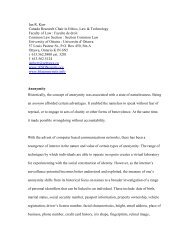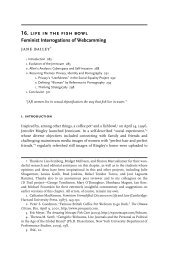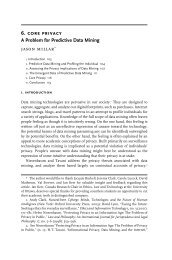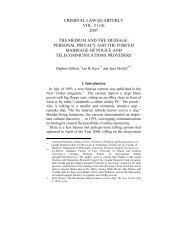Complete Cases Chart - Supreme Court of Canada - On the Identity ...
Complete Cases Chart - Supreme Court of Canada - On the Identity ...
Complete Cases Chart - Supreme Court of Canada - On the Identity ...
Create successful ePaper yourself
Turn your PDF publications into a flip-book with our unique Google optimized e-Paper software.
Case Name (<strong>Court</strong>)<br />
(Judge)<br />
Location/Method <strong>of</strong> Search Relevant Statutes Issues/Holdings<br />
- (1) whe<strong>the</strong>r <strong>the</strong> search violates s. 8 <strong>of</strong> <strong>the</strong>C<strong>Chart</strong>er? - Y/N<br />
- (2) whe<strong>the</strong>r to exclude evidence by s. 24(2)? – Y/N<br />
Reasoning<br />
- (1) relevant to s.8 + CASES (Kokesch, Plant, Hunter, Tessling, Edwards)<br />
- (2) relevant to 24(2) + CASES (Collins)<br />
R. v. Neill<br />
[1993] 33 B.C.A.C.<br />
118<br />
Taggart J.A.; Wood<br />
and Gibbs JJ.A. (con).<br />
*Final Level<br />
Property search-<br />
Home<br />
(Perimeter Searches)<br />
R. v. Blinch<br />
1993 CanLII 1433<br />
(BC C.A.)<br />
Rowles J.A.;<br />
Southin and Legg<br />
JJ.A. (con).<br />
* Final Level<br />
Property Search -<br />
Home<br />
- A police <strong>of</strong>ficer received<br />
information from an<br />
informant that marijuana was<br />
being grown on <strong>the</strong> accused’s<br />
premises.<br />
- The <strong>of</strong>ficer's believed <strong>the</strong> tip<br />
was reliable based on<br />
previous interaction with <strong>the</strong><br />
informant.<br />
- The <strong>of</strong>ficer walked onto <strong>the</strong><br />
accused’s property to check<br />
<strong>the</strong> house number and he<br />
observed that <strong>the</strong> basement<br />
windows were blocked.<br />
- Finding this suspicious, <strong>the</strong><br />
<strong>of</strong>ficer obtained a warrant to<br />
search <strong>the</strong> premises.<br />
- Based on information<br />
provided by a neighbour, <strong>the</strong><br />
accused’s wife fears her<br />
husband will kill himself,<br />
<strong>the</strong>ir kids and his in-laws.<br />
- The neighbour, who had<br />
been authorized to enter <strong>the</strong><br />
premises by <strong>the</strong> accused and<br />
his wife, granted police<br />
access/entry to <strong>the</strong> accused’s<br />
residence.<br />
- Police obtained a search<br />
warrant and seized wills,<br />
guns and ammunition.<br />
– They did not disclose in <strong>the</strong><br />
application for a warrant that<br />
police had previously entered<br />
<strong>the</strong> property.<br />
- The appellant seeks to have<br />
<strong>the</strong> handwritten wills<br />
excluded from evidence.<br />
- <strong>Chart</strong>er, ss. 8, 24(2). - (1) Did <strong>the</strong> police violate s. 8 <strong>of</strong> <strong>the</strong> <strong>Chart</strong>er<br />
by walking onto <strong>the</strong> accused’s property to<br />
check <strong>the</strong> house number?<br />
<strong>Chart</strong>er, s.8.<br />
• NO<br />
- (1) Did <strong>the</strong> warrantless search violate <strong>the</strong><br />
accused’ s.8 rights?<br />
• YES<br />
- (2) Was <strong>the</strong> failure to disclose <strong>the</strong><br />
warrantless search sufficient to vitiate <strong>the</strong><br />
search warrant that was subsequently issued?<br />
• NO<br />
- (3) If <strong>the</strong> search warrant wasn’t vitiated,<br />
should <strong>the</strong> evidence be excluded under 24(2)?<br />
• NO<br />
- (1) There could be no expectation <strong>of</strong> privacy in a house number so no infringement<br />
<strong>of</strong> <strong>the</strong> accused's rights under <strong>the</strong> <strong>Chart</strong>er occurred.<br />
- The <strong>of</strong>ficer's conduct in walking parallel to <strong>the</strong> front <strong>of</strong> <strong>the</strong> house and looking<br />
down <strong>the</strong> side <strong>of</strong> <strong>the</strong> house while leaving <strong>the</strong> premises was no more than a most<br />
insignificant trespass.<br />
- The <strong>of</strong>ficer went on <strong>the</strong> premises to confirm <strong>the</strong> residential address ra<strong>the</strong>r than to<br />
conduct a perimeter search.<br />
- Ref. to Kokesch (evidence obtained through a <strong>Chart</strong>er breach invalid; boundaries<br />
<strong>of</strong> a perimeter search <strong>of</strong> home; facts <strong>of</strong> two cases compared).<br />
- Ref. to Hunter (purpose <strong>of</strong> s. 8; Hunter standard).<br />
- (1) Warrantless searches are presumed unreasonable.<br />
- The search was not o<strong>the</strong>rwise authorized by statute. The neighbour who provided<br />
access could not waive <strong>the</strong> accused’s rights.<br />
- At issue was <strong>the</strong> validity <strong>of</strong> “consent searches” without a warrant. This was<br />
recognized as an area not well developed in <strong>the</strong> case law.<br />
- (2) Police learned nothing new when <strong>the</strong>y entered but ra<strong>the</strong>r confirmed what <strong>the</strong><br />
neighbour had told <strong>the</strong>m. Her information would have been sufficient for <strong>the</strong><br />
issuance <strong>of</strong> warrant.<br />
- If a Justice <strong>of</strong> <strong>the</strong> Peace is misled <strong>the</strong>n <strong>the</strong> warrant will be vitiated (and admitting<br />
evidence obtained in such circumstances would bring <strong>the</strong> administration <strong>of</strong> justice<br />
into disrepute).<br />
- (3) Factors (following Collins):<br />
• trial Fairness;<br />
• “real” evidence obtained in violation <strong>of</strong> <strong>Chart</strong>er will “rarely operate unfairly for<br />
that reason alone”;<br />
• <strong>the</strong> seriousness <strong>of</strong> <strong>the</strong> <strong>Chart</strong>er violation: <strong>Court</strong> must discourage egregious police<br />
conduct. Factors in determining seriousness are whe<strong>the</strong>r <strong>the</strong> violation was<br />
deliberate, wilful or flagrant, or committed in good faith; whe<strong>the</strong>r <strong>the</strong> violation<br />
was motivated by urgency or necessity to preserve evidence; and whe<strong>the</strong>r o<strong>the</strong>r<br />
investigative techniques were available.<br />
- In this case police conduct not egregious because: police faced an urgent need for<br />
42







